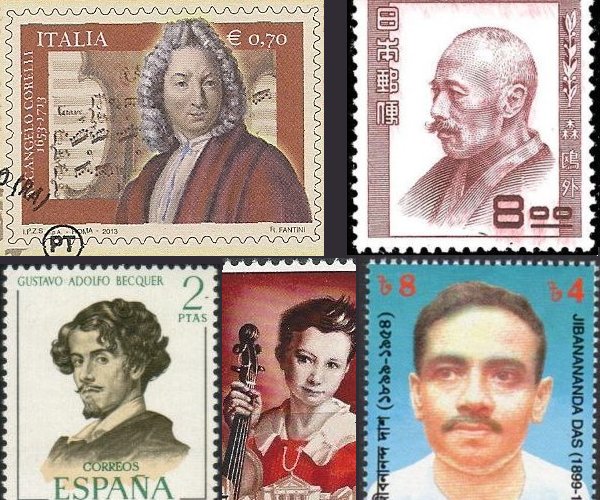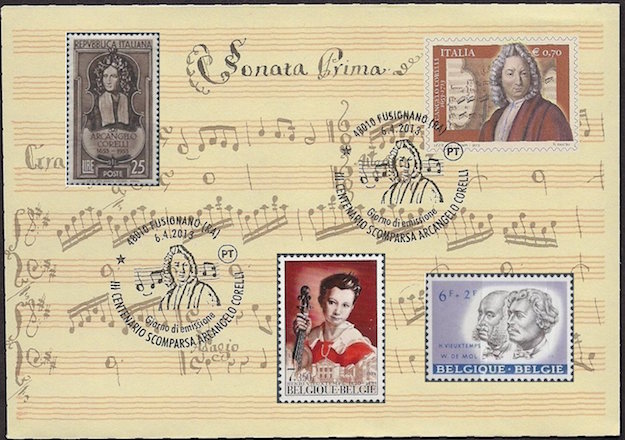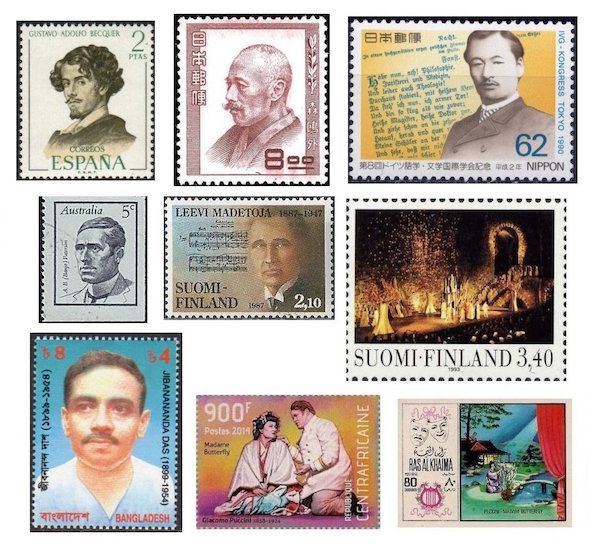The Arts on the Stamps of the World — February 17
An Arts Fuse regular feature: the arts on stamps of the world.

By Doug Briscoe
Born on February 17 were composers Arcangelo Corelli, Henri Vieuxtemps, and Leevi Madetoja, writers Gustavo Adolfo Bécquer, Mori Ōgai, and Jibanananda Das, and the man who wrote “Waltzing Matilda.” This date also saw the première of Puccini’s Madama Butterfly in 1904.
I find it a bit surprising that there is only one stamp for a composer of such importance as Arcangelo Corelli (17 February 1653 – 8 January 1713). Italy issued this one back in 1953 for the composer’s 300th birthday. In 2013 a postal card (used here as the backdrop for the Corelli and Vieuxtemps stamps) was also issued for the tricentenary of his death, but that’s it. He was not a prolific composer, with only a half-dozen opus numbers of twelve works each, but their influence was far-reaching, and his manner of playing the violin, as carried on by such figures as Geminiani and Locatelli, was seminal.
Belgian violinist and composer Henri Vieuxtemps (1820 – 6 June 1881) must share one of his two stamps with his countryman Willem De Mol (I’ll show this stamp again on De Mol’s birthday, coming up on March 1), and the other one depicts him in childhood. Vieuxtemps studied in Vienna with Simon Sechter and, like César Franck, in Paris with Anton Reicha. He toured Europe, where his performances drew plaudits from such figures as Schumann, Berlioz, and Paganini, and the United States, where his accompanist was Sigismund Thalberg. Vieuxtemps spent several years in St. Petersburg, Russia, as court musician of Tsar Nicholas I. At the Brussels Conservatory his greatest pupil was Eugène Ysaÿe. As a composer Vieuxtemps wrote mostly for his own instrument, including seven concertos. His Guarneri del Gesù violin is now owned by Anne Akiko Meyers.

The writer known as Gustavo Adolfo Bécquer (1836 – December 22, 1870) was born Gustavo Adolfo Claudio Domínguez Bastida to a Flemish painter who lived in Seville. Gustavo’s brother, also a painter, had adopted their father’s family name, Bécquer, and Gustavo followed suit. He, too, showed an early inclination for drawing and would continue to draw throughout his life, though his main creative impulse was for writing. His book of poetry Rhymes and the short story collection Legends, usually published together as Rimas y leyendas, are a cornerstone of Spanish literature, internationally taught in Spanish language high schools. It has been suggested that Bécquer is more widely read than any other Spanish author after Cervantes.
Mori Ōgai (1862 – July 8, 1922) is probably best known to Western readers as the author of the novel The Wild Geese (Japanese: Gan, 1911–13), made into a film by Shiro Toyoda called The Mistress in 1953, and for the fact that one of his stories served as the basis for the classic Kenji Mizoguchi film Sansho the Bailiff (1954). Mori was born to a family of hereditary physicians to a daimyo, and his career in medicine was singularly impressive—in the army he rose from the rank of deputy surgeon (lieutenant) to Surgeon General of the Army (lieutenant general), the Japanese Army Medical Corps’ highest post. As a young officer he was sent to Germany for study in the 1880s, and there he became interested in European literature. (He is said to have been the very first Japanese person to have ridden on the Orient Express.) In the years 1889-1892 he not only produced a book of poetry (1889) and his first novel, The Dancing Girl (1890), but also founded a literary journal (Shigarami soshi, 1889–1894). His medical career in the army kept him from much writing in the decade or so thereafter, but he did edit another literary journal between 1892 and 1909. From this point, Mori once again took up his pen for semiaoutobiographical fiction, then historical stories, and finally biographies of notable Japanese medical men. With his knowledge of German, he was also a prolific translator of Goethe, Schiller, Ibsen, Hans Christian Andersen, and Gerhart Hauptmann. (I assume he derived the Ibsen and Andersen from German versions, though for all I know he may have been conversant with Scandinavian languages, also.)

Andrew Barton “Banjo” Paterson (1864 – 5 February 1941) wrote many ballads and poems about the Outback, among them “Waltzing Matilda” and “The Man from Snowy River”. (The tune for “Waltzing Matilda” derives ultimately from an 1818 song by one James Barr. Paterson heard it played in transcription by a brass band as “The Craigielee March”. As for “The Man from Snowy River”, it was adapted for the screen in 1982 as a vehicle for Kirk Douglas.) The volume in which these lyrics appeared in 1895 sold like the proverbial hot cakes on the barbie and made “The Banjo” a household name. Paterson also served as a war correspondent in the Second Boer War and wrote two novels and many short stories. He is held in such high regard in Australia that his picture is on the $10 banknote.
Finnish composer Leevi Madetoja (1887 – 6 October 1947) studied with Sibelius, d’Indy, and Robert Fuchs (whose birthday was two days ago; no stamp). He left us an opera, The Ostrobothnians—the set of which is seen on another Finnish stamp—and three fine symphonies; a fourth seems to have been lost when his briefcase was stolen at a Paris train station.
Academics have called Jibanananda Das (1899 – 22 October 1954) “the pre-eminent and best loved Bengali poet after Tagore” (Amit Chaudhuri) and “Bengal’s greatest modern poet” (Clinton B. Seely). Jibanananda Das was born in the south of Bangladesh. His mother had written a famous poem called “Adôrsho Chhele” (“The Ideal Boy”) that remains well known to Bengalis to this day. A rather self-effacing man and one who endured much poverty, Das did much of his writing privately but did enjoy a rather wide reputation and see seven volumes of his poems published during his lifetime. After his death several novels and many short stories were discovered. Mortally injured by a streetcar in what may have been a suicide attempt, Das died eight days later. Allen Ginsberg remembered him with these words: “One poet now dead, killed near his fiftieth year … did introduce what for India would be ‘the modern spirit’ – bitterness, self-doubt, sex, street diction, personal confession, frankness, Calcutta beggars etc. – into Bengali letters.”
The first version of Madama Butterfly (in two acts) was heard on 17 February 1904, 213 years ago today, at La Scala in Milan. It was not well received, and Puccini’s revised version, the one we know today, was given at Brescia a few months later, on 28 May.
A graduate of the University of Massachusetts with a B.A. in English, Doug Briscoe worked in Boston classical music radio, at WCRB, WGBH, and WBUR, for about 25 years, beginning in 1977. He has the curious distinction of having succeeded Robert J. Lurtsema twice, first as host of WGBH’s weekday morning classical music program in 1993, then as host of the weekend program when Robert J.’s health failed in 2000. Doug also wrote liner notes for several of the late Gunther Schuller’s GM Recordings releases as well as program notes for the Boston Classical Orchestra. For the past few years he’s been posting a Facebook “blog” of classical music on stamps of the world, which has now been expanded to encompass all the arts for The Arts Fuse

